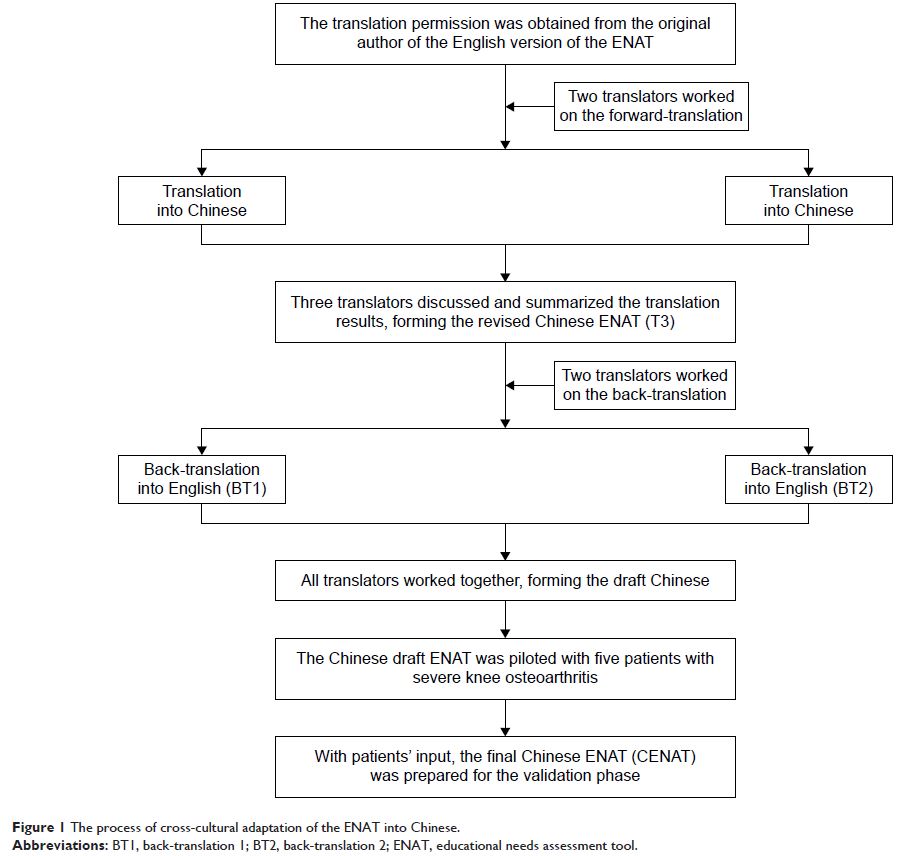108985
论文已发表
注册即可获取德孚的最新动态
IF 收录期刊
- 3.4 Breast Cancer (Dove Med Press)
- 3.2 Clin Epidemiol
- 2.6 Cancer Manag Res
- 2.9 Infect Drug Resist
- 3.7 Clin Interv Aging
- 5.1 Drug Des Dev Ther
- 3.1 Int J Chronic Obstr
- 6.6 Int J Nanomed
- 2.6 Int J Women's Health
- 2.9 Neuropsych Dis Treat
- 2.8 OncoTargets Ther
- 2.0 Patient Prefer Adher
- 2.2 Ther Clin Risk Manag
- 2.5 J Pain Res
- 3.0 Diabet Metab Synd Ob
- 3.2 Psychol Res Behav Ma
- 3.4 Nat Sci Sleep
- 1.8 Pharmgenomics Pers Med
- 2.0 Risk Manag Healthc Policy
- 4.1 J Inflamm Res
- 2.0 Int J Gen Med
- 3.4 J Hepatocell Carcinoma
- 3.0 J Asthma Allergy
- 2.2 Clin Cosmet Investig Dermatol
- 2.4 J Multidiscip Healthc

应教育之需将用于严重膝关节骨性关节炎的评估工具转换成中文的跨文化验证
Authors Zhao H, Dong Z, Xie F, Wang G, Wen Z, Zhang L, Ndosi M, Luo W
Received 23 January 2018
Accepted for publication 14 March 2018
Published 3 May 2018 Volume 2018:12 Pages 695—705
DOI https://doi.org/10.2147/PPA.S163492
Checked for plagiarism Yes
Review by Single-blind
Peer reviewers approved by Dr Andrew Yee
Peer reviewer comments 3
Editor who approved publication: Professor Qizhi (Cathy) Yao
Background: Patient education is an integral part of the management of
osteoarthritis. The educational needs assessment tool (ENAT) was developed in
the UK to help direct needs-based patient education in rheumatic diseases.
Aim: The aim of the study was to adapt and validate the ENAT into
Chinese, for use in severe knee osteoarthritis (KOA).
Methods: This cross-cultural validation study took two phases: 1)
adaptation of the ENAT into Chinese (CENAT) and 2) validation of the CENAT. The
Construct validity was determined using factor analysis and criterion-related
validity by comparing data from CENAT with data from different self-efficacy
scales: patient–physician interactions scale (PEPPI-10), self-efficacy for
rehabilitation outcome scale (SER), and the self-efficacy for exercise scale
(SEE).
Results: The sample comprised 196 patients, with mean age 63.6±8.7 years,
disease duration was 11.5 years, and 57.1% were female. The CENAT was found to
have high internal consistency. The CENAT had weak correlations with the
Chinese versions of PEPPI r =0.40, SER r =0.40, and SEE r =0.39. There were no correlations
with age r =-0.03 or disease duration r =-0.11.
Conclusion: The ENAT translated well into Chinese and has evidence of validity
in KOA. Future studies will further inform its usefulness in clinics,
community, and online settings.
Keywords: assessment, educational needs, knee osteoarthritis, instrument
validation
